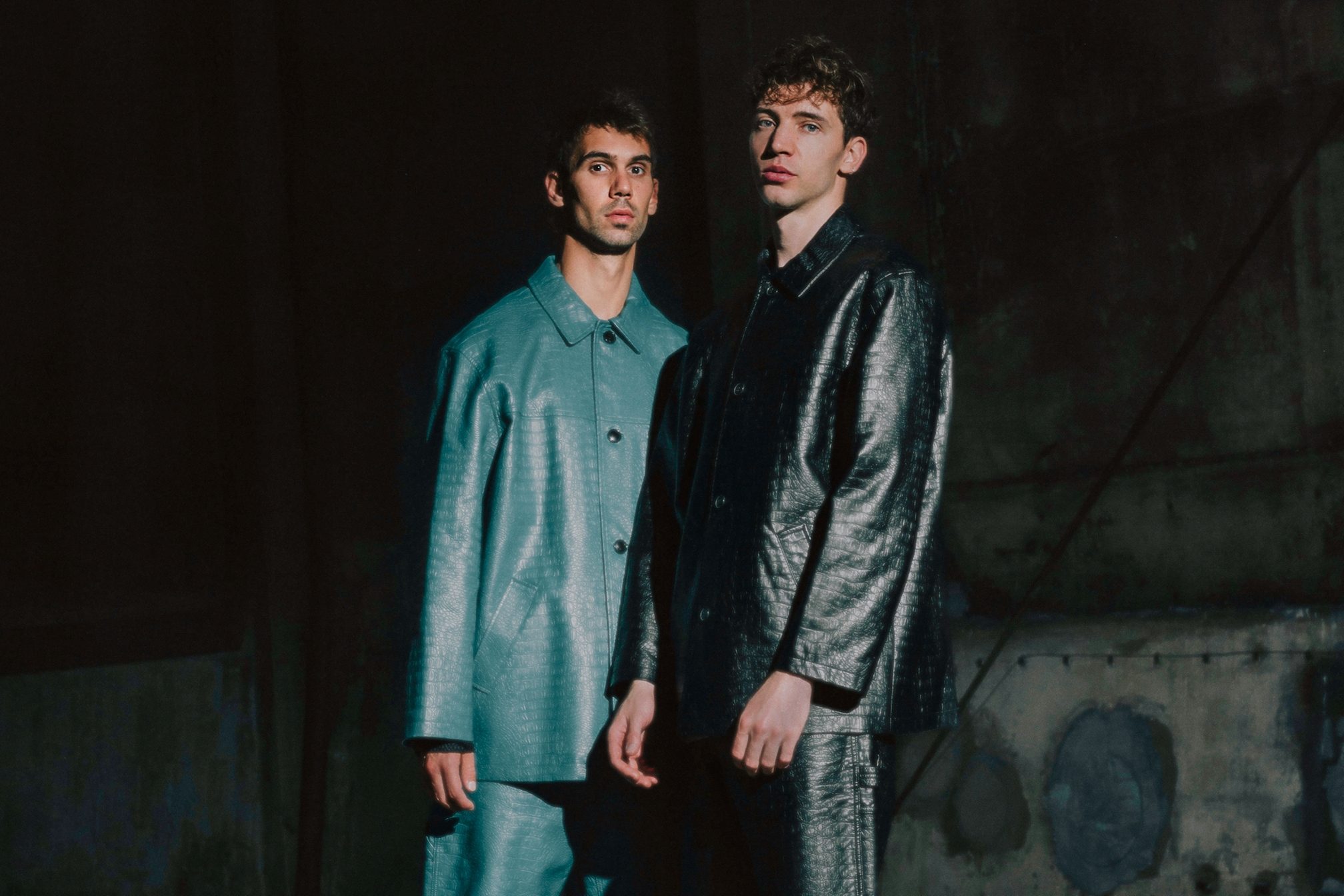 Features
Features
FJAAK don't want to play the techno industry game
Now a duo, FJAAK just want to make music and have fun. Upon the the release of their new album ‘FJAAK THE SYSTEM’, they talk to Paul Hanford about being musicians first and foremost
“Everything we did here, it’s ‘FJAAK THE SYSTEM’,” says Felix Wagner. It’s release day for him and best friend Aaron Röbig and this is the first of several mentions for their third album’s rally cry of a title that will rise up over our hour long chat. FJAAK have arrived at a point in their 15 year ride where, with increasing global-recognition, coupled with the duo’s charismatic, blunt-smoking online personas, crossover success seems a real prospect. They could well, like anyone in their situation, be forgiven for getting a little caught up in chasing as big an audience as possible, even at the altar of sacrificing precious underground values. Yet Felix shrugs: “This isn’t gonna be the album of ours that gets 30 million streams. That's not what we did here.”

FJAAK, if anything, are a bunch of contradictions. On one hand, they’re rooted in their home city of Berlin’s love of the underground to such an extent that Aaron tells me he doesn’t know who Calvin Harris is. Yet at the same time, they have repeatedly been labeled, perhaps affectionately, as “techno's number one boyband.” A label that may have been accrued through the sheer unusualness within the underground techno landscape of initially being a four-piece. Yet, any thought that the boys could be a BTS in Rick Owens doesn’t tally with the anti-industry stance they take through our conversation today. “To be honest with you, today is release day and we have nothing to post. Can you imagine?” Felix says, with an air that is both casual yet unfettered. Despite Insta fame they seem unfussed. Felix, the one with the wavy hair, is a little more provocative during our conversation compared to the somewhat more diplomatic, sometimes neatly-bearded Aaron. Yet, there’s never a point they don’t come across as unified, naturally knowing when to let each other come in. They tell me that, contrary to what some might believe, they don’t have a manager, and are certainly not letting expectations to deliver interfere with what is important to them. “It sounds weird,” Aaron says, “but, man, we're just musicians.”
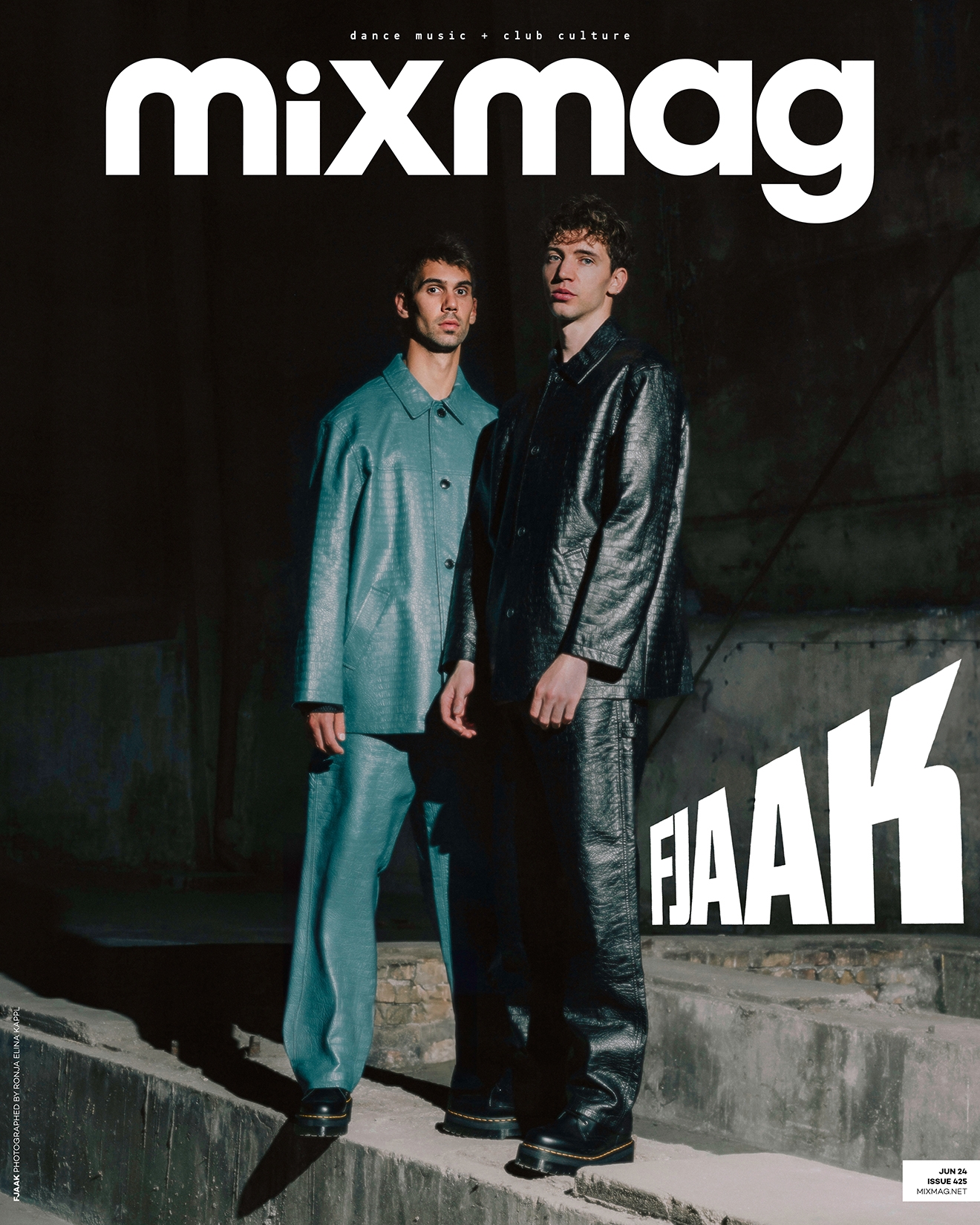
Their music, too, kind of wants to have its cake and eat it: there are moments during the new album ‘FJAAK THE SYSTEM’ where the beats are huge — The Prodigy huge. However, any accompanying explosion into an equivalent big room-sized series of drops is dismissed in favour of mood building and a jammed out quality that digs into their love of playing hardware.
Read this next: The Cover Mix: FJAAK
Despite the duo being a mere few stops away from where I am on Berlin’s U-Bahn, we’re on Zoom. Being caught up in a punishing release-date schedule, where live shows and sleepless nights are followed with studio preparation and more sleepless nights, has consequently left Felix with flu-like symptoms, as well as, after playing outdoors in Paris, sunburn on the left side of his face. “I looked like Scarface,” he laughs. Berliners through and through, they both have a distinctly homegrown casualness that, even through Zoom, feels like we’re sat in a park, passing a joint around: unfiltered and relaxed. Just two guys from Spandau — a district out at the end of the U7 line, far away enough from the city centre that it often gets dismissed as provincial.
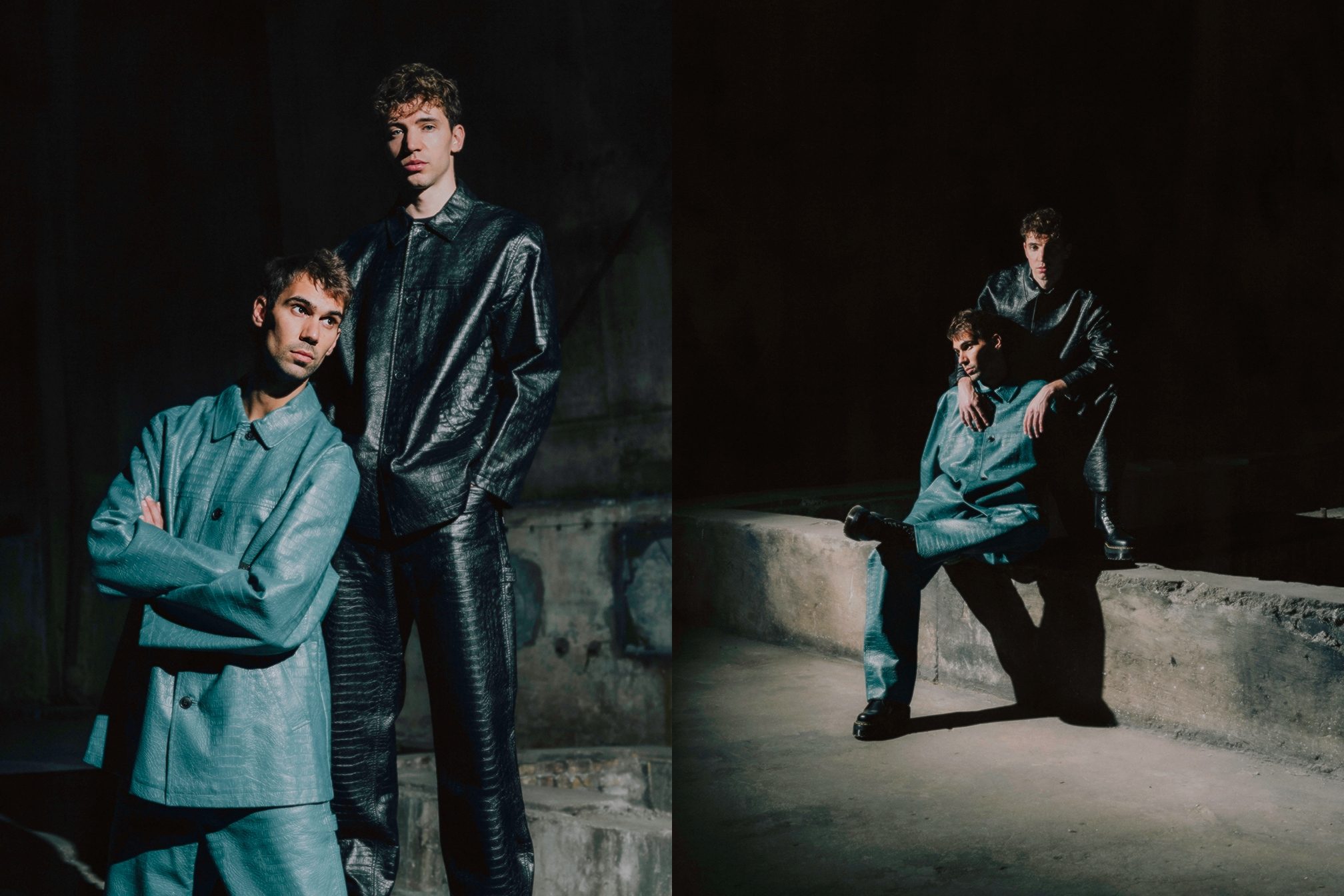
Felix explains how contradictions have always been present in FJAAK from the get go, manifesting in an unwillingness to toe the line with expectations that have sometimes caused confusion among the more conservative, techno purist side of Berlin’s club culture. “We got criticised for playing too many breakbeats in Berghain,” he laughs. “Also, back when we started people said that we have way too many house sounds, or that it's way too happy or not dark enough.”
“And this is represented in this album being ‘FJAAK THE SYSTEM’,” Aaron explains. “It's not like we want to be big in the system and be famous, that was never the plan. We were super outsiders and we started it because we loved the music.”


Back when they formed, in the late noughties, FJAAK were four. FJAAK, being an acronym of their names: Felix and his brother Johannes, Aaron and Kevin. Johannes left the group first, and now, alongside DJing from time to time as J.Manuel, ghost produces for Robbie Williams, they tell me. He also returns for one track on ‘FJAAK THE SYSTEM’ — the ‘90s-esque breakbeat orientated ‘Wind Mill Hill’. Kevin Kozick left in 2019, not long after the release of the band’s second album, ‘Havel’, and now has a solo career as Kev Koko. Yet rather than the now-duo having to find their feet as a unit after losing half their team, Aaron considers that whatever changes have happened, the current iteration has created a fresh sense of coming full circle. “When we were really young, like 15 or 16, it was more that Felix and me were best friends and Johannes and Kevin were best friends, and then, because we were chilling all the time, we thought — let’s do some music together.” Although they found bridges, the two distinct units had different influences: J and Kevin dug more into rock while Felix and Aaron were hooked on hip hop and drum n’bass. “It was nice for a time,” Aaron goes on to say, perhaps diplomatically: “But at some point, some people can lose their focus on music and art and just go with the industry. I was so happy that in the end we could go back to just loving music and not doing it to be successful.”

Which brings us again to ‘FJAAK THE SYSTEM’, all 23 tracks and 73 minutes of it. It’s an album that feels like it’s been made from the joy of hooking up a gamut of hardware — 909s, 808s, analogue synths, without, they claim, any major sampling and just letting rip. Here, the duo take an unbridled approach to creation, sifting through over 300 tracks made over a five year timeframe — the intention being to just create, not to write an album that was thematically thought out from the beginning. “We just produce a lot of stuff and there's not enough platforms,” Aaron says simply. “We will never be able to release all of that, so in the end, you always just have a small window of listening to us, which is more like one percent.”
Read this next: How the fall of the Berlin Wall forged an anarchic techno scene
Sonically, there are frequent moments during 'FJAAK THE SYSTEM' where Felix and Aaron nudge far beyond the four-on-the-floor big room techno of early EPs like ‘Attack/The Wind’ (2014) and ‘Oben/Unten’ (2015). The evolution here, which in places sounds, with its crunchy hardware beats, like an unearthed and remastered rave cassette from 1992, came out of this natural way of working. “Some tracks are obviously for the floor and they have a lot of power and energy,” Aaron says. “Some tracks have an acid ’90s influence, some tracks are more rave, some tracks don't even have a beat. It was basically like four or five albums we did in the last years and these are our favourites.”
“Because we played live so much since the beginning, we created our own ideas of how to build up energies,” Felix adds. “Basically, we've been arranging live in front of people for 10 years and I think that just educated us, because if you do a bad arrangement in front of people in a club, it's not like they’re your friends and are going to be polite about it.”

This natural approach extends to the album’s featured artists, Red Eye, Modeselektor, Skee Mask and J. Manuel, which all occurred organically. “It was not that we thought that maybe we should have a feature with any of those guys. It was more like we just did music together because we had time to,” Felix explains. That there’s a track with local linchpins Modeselektor, for example, has nothing to do with seizing a promotional opportunity, but because, as Aaron says: “We’ve known them for a really long time.” The track in question, ‘Horsepower’, is only one in a series of connecting points between the two groups, FJAAK’s self-titled debut album came out on Modeselektor’s Monkeytown Records in 2017 and, in addition to the duo’s own two studios, they’ve had access to the Berlin elder statesmen’s studio for the last decade.
Similarly, ‘Black Ice’, the collaboration with Munich producer Skee Mask, with its slightly chopped and staggered breakbeats and reverberating haunted house vibes, came about because, as Felix explains: “We just naturally met up in Bavaria in his crazy studio, without any sleep, for three days just making music, we didn't have a goal in this moment. We were just there to make music and to have fun.”
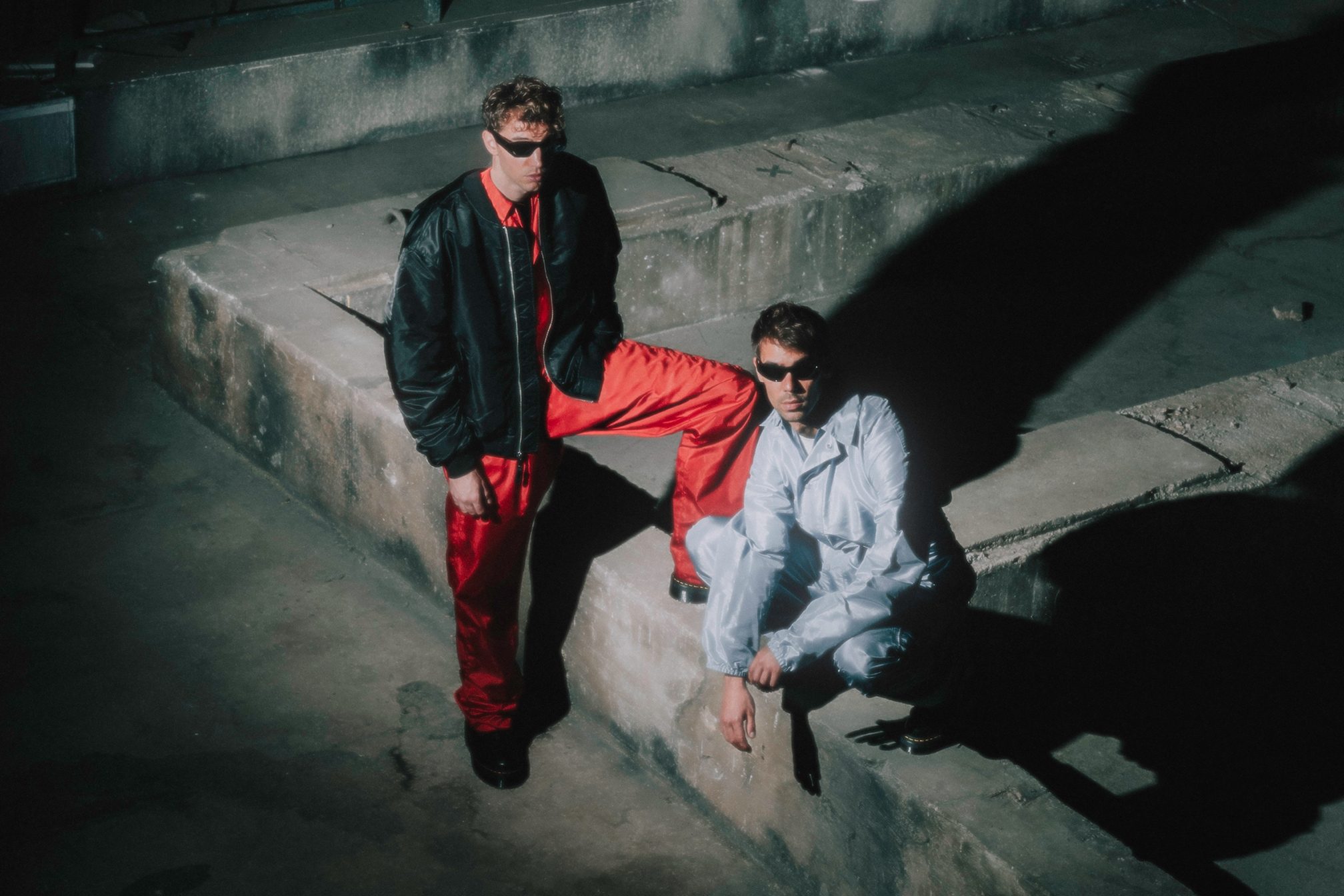
Anything counter to the sheer joy of making music seems to be part of the system that FJAAK are rallying against. Under particularly heavy fire during our conversation is the state of the industry and how the merciless push of PR and social media quashes creativity. “The industry is so boring,” Felix says, perking up considerably through audible remnants of the flu. “It’s like you have to make an album, maximum 10 songs, you work with the promo agency and you do four singles and they all have to be promoted, and everything has to be five months in advance and everything is balloon style, you know, they take something and then blow it up until it breaks.”
Read this next: Please stop calling music 'content'
“Producing content is bullshit,” he goes on to say. We’re off. “It's like you do something that will be consumed in a few seconds and everybody has forgotten about it tomorrow. It's so sad actually. It's such a dystopian world for artists. It's extreme. It’s absolute pressure and, at the same time, nothing has to do with music.” Felix goes onto reveal how they encountered problems with Instagram: “They basically forbid us our whole personality. They said: if you have a club video, make sure that you can see all the faces of the people. I'm like — it’s a rave. You don't want to see all the faces of the people. People don't want to be seen. The true spirit is disturbed by social media. That's actually what's happening, you know.”
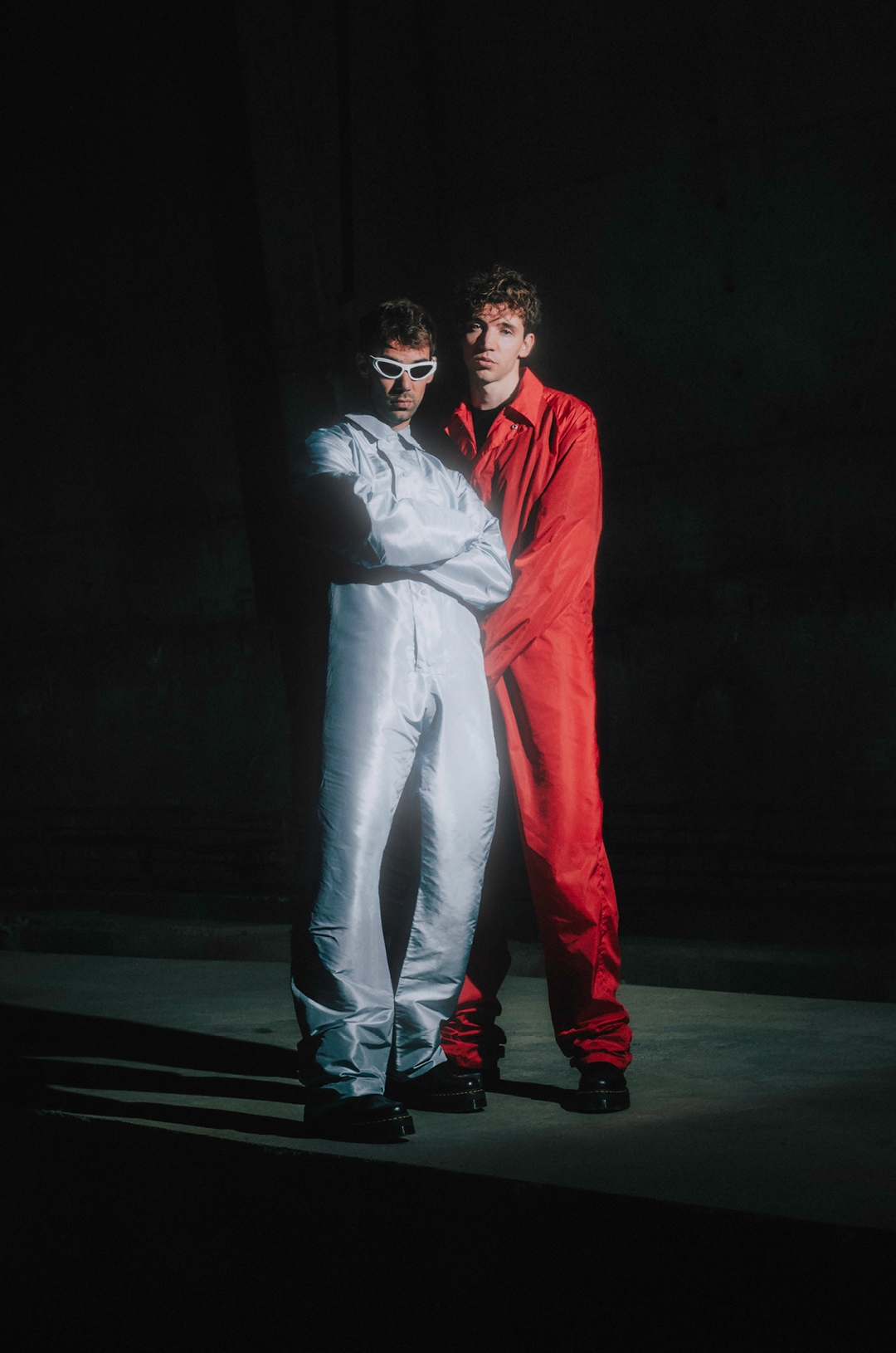
I get the impression that where FJAAK are most happy is in the studio, perhaps live too, surrounded by gear, sometimes accompanied by friends. Yet, they do have industry aspirations — such as with their label Spandau20, which Aaron says is progressing like a clock ticking upwards, growing in ambition with every catalogue number. Although they’re just into the tens, he schemes: “You can imagine what happens when we get to the catalogue number 20. Like, definitely we will come out with an album which has never been made before.”
‘FJAAK THE SYSTEM’ feels like, from our conversation, the natural sonic consequences of a band playfully refusing to dig into industry expectations. And FJAAK themselves, in all of their glorious contradictions, might not toe the line with either the commercial or the underground end of club conventions. Neither techno boyband nor fully paid-up Berlin edgelords, as Aaron says: “We’re just two guys from Spandau, and I think that's super important, actually.”
'FJAAK THE SYSTEM' is out now, buy it here
Paul Hanford is a freelance writer, follow him on Instagram


